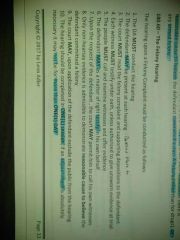![]()
![]()
![]()
Use LEFT and RIGHT arrow keys to navigate between flashcards;
Use UP and DOWN arrow keys to flip the card;
H to show hint;
A reads text to speech;
8 Cards in this Set
- Front
- Back
|
180.10 proceedings upon felony complaint Upon arraignment of a felony complaint the defendant must be given what two things? |
1 he must be informed of the charges against him 2 he must be provided a copy of the felony complaint |
|
|
What is the primary purpose of the arraignment on a felony complaint? |
To determine if the defendant is to be held for the action of the grand jury? |
|
|
On a felony complaint the court must inform the defendant of which 4 rights. |
1 a right to counsel has a right to an adjournment to obtain counsel 2 the right to communicate by letter or phone call to obtain counsel 3 the right to inform a relative that he or she has been charged 4 the right to have counsel appointed if they cannot afford. |
|
|
Upon arraignment a securing order must issue either of which three things? |
1 releasing a defendant in his own recognizance (ROR) 2 fixing bail 3 committing a defendant to the custody of the sheriff for future appearances (remand) |
|
|
180.60 the felony hearing What are the 10 steps in a felony hearing |

|
|
|
Under what 4 circumstances must the court dispose of the felony complaint? |
1 if there's reasonable cause to believe the defendant committed a felony. Order the defendant to be held for action of the grand jury 2 if there's reasonable cause to believe the defendant committed an offense other than a felony. Reduce the charge to one of a non felony offense 3 if there's reasonable cause to believe the defendant committed a felony in addition to a non felony. Reduce the felony to one of a non felony offense but only if the court determines that it's in the interest of justice and the district attorney consents. Cannot be done for class a felonies 4 if there is not reasonable cause to believe the defendant committed a felony. Dismiss the felony complaint, discharge the defendant from custody, and exonerate the bail. |
|
|
180.80 release of dependent upon failure of timely disposition. Similar to Article 170.70, for misdemeanor complaints, however in regards to felonies, upon the defendant on application, he must really be released within how long since arrest? |
120 hours in custody, since arrest, or 144 hours in the event a Saturday Sunday or legal holiday occurs during such custody providing there is no disposition of the felony complaint, filing of the indictment, or felony hearing commenced. 180.80 date. |
|
|
What is the difference between 170.79 date and 180.80 date? |
170.70 - 5 days from arraignment - misdemeanors 180.80 - 120 hours , or 144 hours (Saturdays Sundays legal holidays included) from arrest. - felonies |

